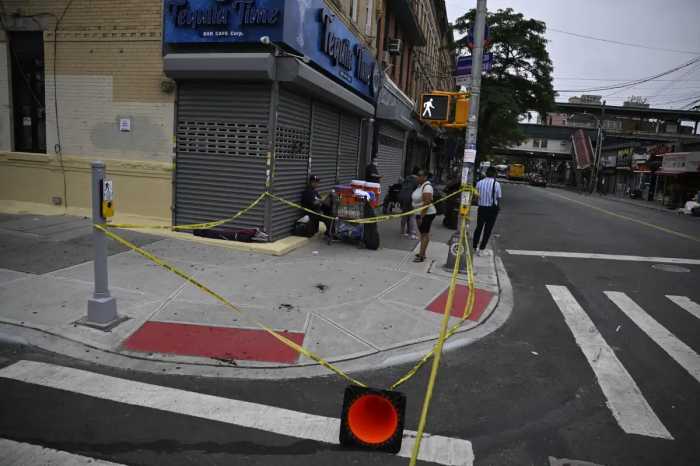Closing Rikers Island over the next decade may be one of the most difficult tasks the city has ever been challenged to complete. Mayor Bill de Blasio admitted as much in announcing the effort on March 31.
Much has been said about the conditions on the island of prisons, how its separation from the city proper helped create an isolated culture of inhumanity and violence where the well-being of prisoners and guards is at risk every day.
The most immediate challenge is logistical; it is also the most important challenge. Where else can the city find space for thousands of prisoners beyond Rikers?
Would you want a new jail in your neighborhood?
There are jails across the city, but others will need to be opened to accommodate them. That’s going to happen even as de Blasio eyes further criminal justice reform that will ultimately reduce the city’s need for jail space.
Building new jails to replace Rikers will be a difficult sell for this city, and especially in Queens. Consider the furious protests unleashed almost every time a new homeless shelter pops up in an underused hotel. That response comes for something that houses people who are law-abiding, down-on-their-luck persons.
We can’t imagine that any community in this borough would accept a correctional facility for criminals without a tremendous fight. We imagine that would hold true for other parts of the city where jails would be proposed.
Acknowledging the problem, but debating the solutions
Already, the boundary lines in this fight are being drawn. In the hours after de Blasio’s announcement, Queens lawmakers issued reactionary statements that either praised the mayor’s efforts, or expressed great concern about what Rikers Island’s closure would mean for the “World’s Borough.”
“For too long, Rikers Island has been a black hole for human rights,” said City Councilman Daniel Dromm. “Rikers Island’s culture of violence remains a constant threat to the well-being of both corrections officers and the incarcerated. It has become emblematic of all that is wrong with our criminal justice system. The city must establish new, smaller facilities in each borough as per the Lippman Commission’s report.”
However, State Senator Joe Addabbo said that the city would be better off reforming Rikers Island rather than saddling the other boroughs with the task of housing inmates in smaller correctional facilities.
“In order to best serve New York City residents, Mayor de Blasio should concentrate more on ways to improve the situation at Rikers, instead of creating new problems with siting facilities across the boroughs, generating multiple security and public safety issues throughout the city,” Addabbo said. “It seems that once again, this administration is looking to merely discard an entire program, much like it has done with cluster sites for homeless individuals, instead of looking for ways to fix it.”
The most grounded statement, perhaps, came from City Councilman Rory Lancman, who noted that while Rikers Island has to go, the city must proceed with great caution.
“Closing Rikers Island is an important goal and I commend the Speaker and Judge Lippman for bringing the Mayor to this conclusion,” Lancman said. “But it requires a serious analysis of how we get from here to there, and the commitment from the mayor to do the things that the city itself can do to lower incarceration: reforming our bail system, expanding adolescent diversion programs, filling judicial vacancies that create a backlog of cases in criminal courts, and fundamentally ending broken windows policing.”
Can Rikers Island be changed from the inside out?
Ideally, a great many Queens residents would probably side with Addabbo’s sentiments in that Rikers Island ought to be fully renovated and reformed over a period of time, building and rebuilding different facilities to house prisoners based on their security risks and needs.
On paper, it would seem better to keep prisoners as far away from us as possible; simply reforming and renovating the prisons might seem like all that’s needed.
But Retired State Chief Judge Jonathan Lippman, who led the commission investigating Rikers Island, made a great point: the geophysical separation of Rikers Island from the city also leads to a psychological disconnect among those who are put there. He noted that it “severs connections with families and communities, with harmful consequences for anyone who spends even a few days on the island.”
“Rikers Island is a stain on our great city,” as noted in the Lippman Commission report. “It leaves its mark on everyone it touches: the correction officers working back-to-back shifts under dangerous conditions, the inmates waiting for their day in court in an inhumane and violent environment, the family members forced to miss work and travel long distances to see their loved ones, the attorneys who cannot easily visit their clients to prepare a defense, and the taxpayers who devote billions of dollars each year to keep the whole dysfunctional apparatus running year after year. Put simply, Rikers Island is a 19th century solution to a 21st century problem.”
The report suggests that Rikers Island is beyond repair, physically and psychologically. The city could pour billions of taxpayer dollars toward rebuilding the island while keeping the inmates there, and make various criminal justice reforms to reduce the amount of prisoners on the island, as well as their length of time there. The commission seems to think that such extensive efforts would be for naught.
Challenging questions for all of us
So how will we meet this challenge to close our city’s most abominable prison?
Do we take up that challenge and find a way to make it happen without destroying neighborhoods?
Do we make the attempt to overhaul Rikers anyway in the hope that we can eliminate the violent culture there?
Or do we just look away and pretend our city doesn’t have a problem on the island?
There are no quick fixes to this situation. Honestly, it’s so complex that we’ve yet to formulate an answer to it. It’s quite clear that Rikers Island is broken, and a tremendous effort must be made to reform the way the city handles its incarcerated individuals to ensure they are kept under secure supervision without endangering their lives and their civil rights — or the well-being of those who guard them.
We are very much interested in what you, the reader, believe ought to be done — and we want your feedback.
Drop us a line by email to editorial@qns.com, or if you prefer write to us at The Queens Courier, 38-15 Bell Blvd., Bayside, NY 11361. Your responses may be featured in an follow-up article.




































